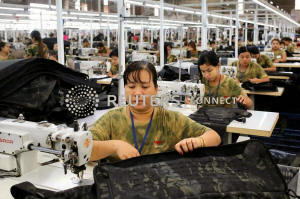|
To dodge trade war, Chinese exporters
shift production to low-cost nations
 Send a link to a friend
Send a link to a friend
 [June 27, 2019]
By Joyce Zhou and Ann Wang [June 27, 2019]
By Joyce Zhou and Ann Wang
GUANGZHOU, China/YANGON (Reuters) -
Pressured by a labor crunch and rising wages in China, Shu Ke'an, whose
company supplies bulletproof vests, rifle bags and other tactical gear
to the United States, first considered shifting some production to
Southeast Asia a few years ago, but nothing came of it.
When trade tensions flared into a tariff war last year, however, it was
the final straw.
A day after U.S. President Donald imposed additional tariffs on $200
billion of Chinese goods in September, Shu, 49, decided to start making
vests for his U.S. clients in Myanmar instead.
Since then, the Trump administration has further hiked tariffs on
Chinese imports, raising the U.S. taxes on Shu's Guangzhou-made
bulletproof vests to 42.6%.
With more than half of his company's income reliant on orders from the
United States, Shu was happy with his Myanmar decision.

"The trade war was actually a blessing in disguise," he said.
With Trump poised to slap 25% tariffs on another $300 billion-plus of
Chinese goods, no exporter in China will be unscathed.
In recent years, some Chinese manufacturers had already started to
relocate some of their capacity to countries such as Vietnam and
Cambodia, due to high operating costs at home. The trade war is now
pushing more to follow suit, especially makers of low-tech and low-value
goods.
A few Chinese exporters have also tried to dodge the trade war bullet by
quietly transhipping via third countries.
CHOICE DESTINATION
Nine months on, Shu's firm, Yakeda Tactical Gear Co, is relying on his
new Myanmar factory, which started operations in December, to produce
new orders for its U.S. clients.
The 220 workers at his original Guangzhou plant, in China's Pearl River
Delta manufacturing powerhouse, now mostly supply clients in the Middle
East, Africa and Europe.
In Yangon, meanwhile, Shu's Myanmar factory turns raw materials imported
from China into backpacks, kit bags and pouches for rifles and pistols -
all labeled "Made in Myanmar" - almost all of which are exported to the
United States.
"Our factory is receiving many orders. The products are being exported
to the U.S. and Europe. So, I believe our future will be improved from
working in this factory," said Marlar Cho, 36, a supervisor at the
factory.
The factory manager, 40-year-old Jiang Aoxiong from eastern China, said
they were constantly rushing to keep up with orders, despite its
600-strong workforce.

Though international criticism of Myanmar's handling of the Rohingya
crisis has crimped Western investment, the Southeast Asian nation has
become the choice destination for some Chinese firms, drawn to its cheap
and abundant labor.
The former British colony, located on China's southwestern border,
exports some 5,000 products to the United States duty-free under a U.S.
trade program for developing nations - another big plus.
In the 12 months through April, approved Chinese projects increased by
$585 million, the latest data from Myanmar's Directorate of Investment
and Company Administration shows.
The infusion of Chinese capital has helped fuel expansion in Myanmar's
fledging industrial sector.
In May, firms saw the fastest rise in workforce numbers since 2015,
while production scaled a 13-month high, the latest Nikkei Myanmar
Manufacturing Purchasing Managers' Index survey showed.
[to top of second column]
|

Workers assemble products at a factory owned by Yakeda Outdoor
Travel Products Co. LTD in Yangon, Myanmar, June 11, 2019.
REUTERS/Ann Wang

STAY OR GO?
ACMEX Group, a tire maker based in China's coastal Shandong
province, already had some experience with offshoring when the trade
war began.
About two years ago, it started manufacturing some tires in Vietnam,
Thailand and Malaysia to take advantage of lower labor and raw
material costs and avoid U.S. anti-dumping duties.
With fresh tariffs in the trade war, the company plans to boost the
proportion of tires made abroad to 50% from 20%, and build its own
factories instead of outsourcing to existing factories, Chairman
Guan Zheng said.
"The time is ripe now," he said, adding that supply chain
infrastructure had improved.
The experience of companies like ACMEX and Shu's Yakeda Tactical
Gear underlines how the trade war has put Chinese exporters on the
back foot, needing to either diversify their client base, increase
domestic sales or move production to a third country.
But all those options require time and money, which are not
necessarily available to China's legion of small exporters grappling
with thinning profit margins.
Even locations such as Vietnam and the Philippines have grown too
dear for some.
While China has encouraged the relocation of some heavy industry
overseas to ease overcapacity and support its ambitious Belt and
Road infrastructure plan, Beijing is less supportive of a broader
move to shift manufacturing offshore.

Liang Ming, director of the Institute of International Trade at the
Ministry of Commerce's Chinese Academy of International Trade and
Economic Cooperation, rejected the idea that Chinese firms were
leaving China in droves.
"Few companies are actually moving. If they move, they risk losses
if there is a China-U.S. deal," Liang told reporters earlier this
month, adding that any relocation back to China would be expensive.
As trade pressures intensify, analysts say China will loosen policy
further in months ahead to shore up economic growth.
Investors are also watching to see how much Beijing allows the yuan
to weaken to offset higher U.S. tariffs. The tightly-managed
currency has depreciated about 2% against the dollar since trade
tensions worsened in early May.
Trump and Chinese President Xi Jinping are due to meet in Osaka at a
G20 summit at the end of this week in a bid to reset ties poisoned
by the trade war.
And though costs and labor may be cheaper, some Chinese firms with
experience of offshoring say there are downsides too.
Factory manager Jiang complained about lower worker productivity in
Myanmar compared with China, flooded roads during the rainy season,
and power cuts of eight to nine hours every day.
"If there is no trade war between China and the U.S., we definitely
would not have come to Myanmar to open our factory," he said.
(Reporting by Joyce Zhou and Ann Wang; Additional reporting by Simon
Lewis in YANGON, John Ruwitch in SHANGHAI and Irene Wang and Michael
Martina in BEIJING; Writing by Ryan Woo; Editing by Alex Richardson)
[© 2019 Thomson Reuters. All rights
reserved.]
Copyright 2019 Reuters. All rights reserved. This material may not be published,
broadcast, rewritten or redistributed.
Thompson Reuters is solely responsible for this content.
 |